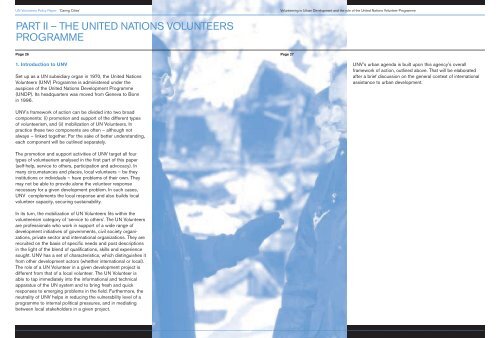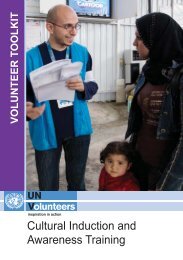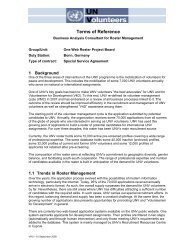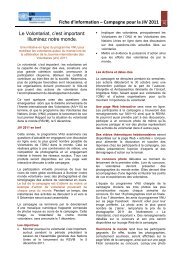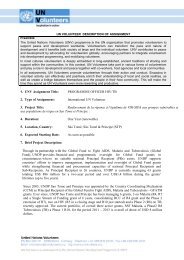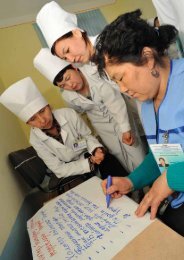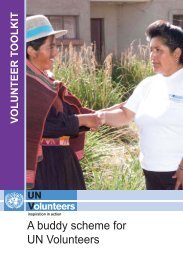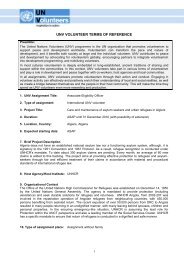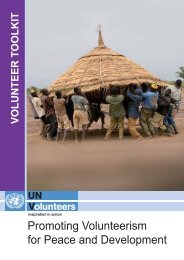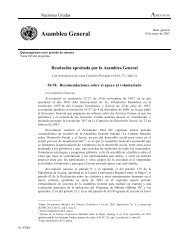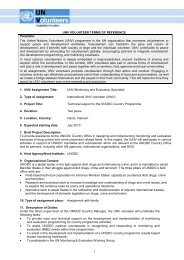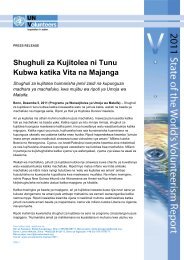View associated PDF document - United Nations Volunteers
View associated PDF document - United Nations Volunteers
View associated PDF document - United Nations Volunteers
Create successful ePaper yourself
Turn your PDF publications into a flip-book with our unique Google optimized e-Paper software.
UN <strong>Volunteers</strong> Policy Paper<br />
‘Caring Cities’<br />
Volunteering in Urban Development and the role of the <strong>United</strong> <strong>Nations</strong> Volunteer Programme<br />
PART II – THE UNITED NATIONS VOLUNTEERS<br />
PROGRAMME<br />
Page 26<br />
Page 27<br />
1. Introduction to UNV<br />
Set up as a UN subsidiary organ in 1970, the <strong>United</strong> <strong>Nations</strong><br />
<strong>Volunteers</strong> (UNV) Programme is administered under the<br />
auspices of the <strong>United</strong> <strong>Nations</strong> Development Programme<br />
(UNDP). Its headquarters was moved from Geneva to Bonn<br />
in 1996.<br />
UNV’s urban agenda is built upon this agency’s overall<br />
framework of action, outlined above. That will be elaborated<br />
after a brief discussion on the general context of international<br />
assistance to urban development.<br />
UNV’s framework of action can be divided into two broad<br />
components: (i) promotion and support of the different types<br />
of volunteerism, and (ii) mobilization of UN <strong>Volunteers</strong>. In<br />
practice these two components are often – although not<br />
always – linked together. For the sake of better understanding,<br />
each component will be outlined separately.<br />
The promotion and support activities of UNV target all four<br />
types of volunteerism analysed in the first part of this paper<br />
(self-help, service to others, participation and advocacy). In<br />
many circumstances and places, local volunteers – be they<br />
institutions or individuals – have problems of their own. They<br />
may not be able to provide alone the volunteer response<br />
necessary for a given development problem. In such cases,<br />
UNV complements the local response and also builds local<br />
volunteer capacity, securing sustainability.<br />
In its turn, the mobilization of UN <strong>Volunteers</strong> fits within the<br />
volunteerism category of ‘service to others’. The UN <strong>Volunteers</strong><br />
are professionals who work in support of a wide range of<br />
development initiatives of governments, civil society organizations,<br />
private sector and international organizations. They are<br />
recruited on the basis of specific needs and post descriptions<br />
in the light of the blend of qualifications, skills and experience<br />
sought. UNV has a set of characteristics, which distinguishes it<br />
from other development actors (whether international or local).<br />
The role of a UN Volunteer in a given development project is<br />
different from that of a local volunteer. The UN Volunteer is<br />
able to tap immediately into the informational and technical<br />
apparatus of the UN system and to bring fresh and quick<br />
responses to emerging problems in the field. Furthermore, the<br />
neutrality of UNV helps in reducing the vulnerability level of a<br />
programme to internal political pressures, and in mediating<br />
between local stakeholders in a given project.


